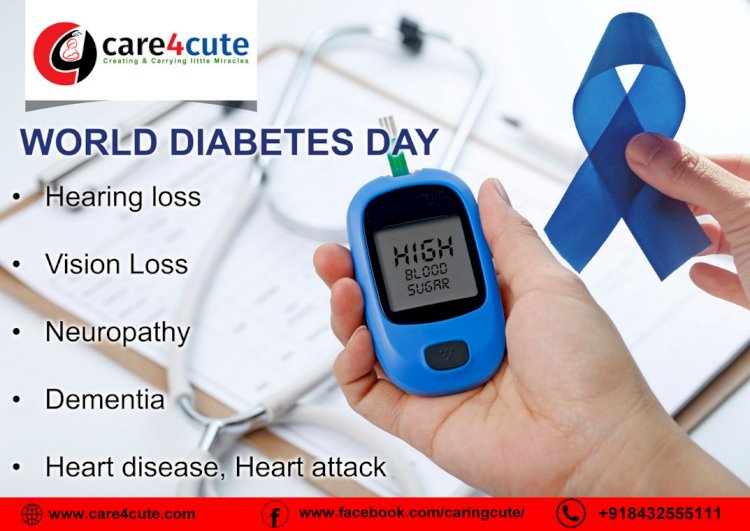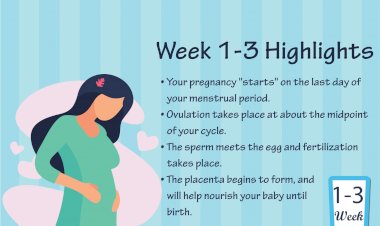November 14 - World Diabetes Awareness Day 2019
World Diabetes Awareness Day is commemorated every year on 14 November to create awareness related to Diabetes amongst people.

World Diabetes day is celebrated on 14 November every year. It was first started in 1991 by international Diabetes Federation and World Health Organization in response to increasing health threat posed by diabetes. The day also marks the birthday of Nobel laureate Sir Frederick Banting, who discovered Insulin with Charles Best in 1922. World diabetes Day is the world’s largest awareness campaign in more than 160 countries.
This campaign is represented by a blue circle logo as a global symbol for awareness and signifies the unity of the global diabetes community.
The theme for world diabetes day 2019 is the Family and Diabetes. It aims to
• Promote the role of family in the management and care, prevention and education about diabetes.
• Raise awareness of the impact of diabetes.
Diabetes concern
• Over 425 million people are living with diabetes. According to IDF, India has second largest number of diabetes cases around 70 million in 2017. Most of these are Type- 2 diabetes.
• Every 100 overweight adult in India, there are 40 adult with diabetes. This increase has been attributed to switch from traditional food to junk food.
• In 2016 an estimated 1.6 million people have died due to diabetes.
• Almost half of all deaths attributable to high glucose occur before the age of 70 year.
What is diabetes?
Diabetes is a chronic disease in which a person has high blood sugar level because either he is not producing enough insulin or his body does not respond properly to insulin. Insulin is a hormone, produced by pancreas, that regulates blood sugar. Insulin helps in utilizing blood glucose by body cell to produce energy. In diabetes , Pancreas does not produces enough insulin and leads to high glucose level in the blood (known as hyperglycemia). Hyperglycemia over the long term is associated with damage to various organs and tissue.
Types of diabetes:-There are three types of diabetes.
Type 1 diabetes: It can develop at any age but mostly occurs in child and adolescence. In type 1diabetes, body does not produce enough insulin. In this type of diabetes, patient requires daily insulin injection to maintain glucose level under control.
Type 2diabetes: It is found in adults and responsible for more then 90% diabetes cases. In this type of diabetes, body produces insulin but can’t use it well. Most of type 2 diabetes cases will require oral insulin drugs.
Gestational diabetes: It is a temporary condition in pregnancy. Gestational diabetes usually disappears after pregnancy.
Symptoms of Diabetes:- Diabetes symptoms are depended on blood sugar level. For example:
• Frequent urination
• Weight loss or gain
• Extreme hunger
• Excessive thirst
• Irritability
• Nausea
• Skin infection/Vaginal infection
• Fatigue
• Slow healing sources
• Blurred vision
• Darkening of skin areas
• Tingling, pain or numbness in hands and feet.
Causes of diabetes:- Actual cause of Diabetes depends on type of diabetes but some factors might increase the risk like obesity, lifestyle, diet, age, family history, genetic makeup, environment factor and ethnicity.
Gestational diabetes causes:- Gestational diabetes causes are unknown, but some factor increases the chance of developing this condition.
• Family History
• Ethnicity
• Overweight
• Polycystic ovary syndrome
How to diagnosis:- Diabetes is diagnosed through blood sugar test. Women are routinely tested for gestational diabetes during their second and third trimester of pregnancy.
Cut off value for diabetes as per WHO is as under
Fasting plasma glucose ≥ 7.0 mmol/L (126 mg/dl)
Two- hour plasma glucose ≥ 11.1 mmol/L (200 mg/dl) following a 75g oral glucose load.
Treatment of diabetes:-
Doctors treat diabetes with different medications. Some of these drugs are taken by mouth and through injections. Insulin is the main treatment of diabetes. It replaces the hormone from body that is not able to produce.
Complications of diabetes:-
Poorly managed diabetes increase risk for many serious health problem, but with adequate treatment and recommended life style changes complications and long term effects can be avoided . Consistently high blood glucose level can lead to serious diseases of the heart and other organs of body.
Maintaining blood glucose level and cholesterol can help delay or prevent diabetes complications.
Complications are as follows:
• Hearing loss
• Depression
• Bacterial or fungal infection
• Vision Loss
• Heart disease, Heart attack
• Neuropathy
• Nephropathy
• Foot damage
• Dementia
Gestational diabetes:-
Uncontrolled gestational diabetes can affect mother and baby. These complications are following:
• Premature birth
• Higher weight
• Low blood sugar
• Jaundice
• Increase risk for type 2 diabetes in life
• Still birth
Diabetes preventions:-
Type 1 diabetes can’t be preventable but type 2 diabetes might preventable. Simple life style measures have been effective in preventing diabetes. With good self management and health professional support, people can live a long and healthy life. People should do following steps.
• Take prescribed medicine regularly
• Eat healthy smaller portions, avoid sugar
• Eat more fruits and green vegetables
• Maintain weight
• Avoid tobacco and alcohol
• Regular checkup
• Exercise such as walking and cycling at least 30 minutes regularly
Diabetes Diet:-
Nutrition and physical activity are important parts of a healthy lifestyle when a patient has diabetes. Healthy diet is the main part of managing diabetes. Ideal meal plan of a diabetes patient should have following.
• Vegetables
o Non starchy: Carrots, Green vegetable, peppers and tomatoes
o Starchy: Green peas, corn and potatoes
• Grains
o Wheat, rice, oats and cornmeal
• Fruits
o Oranges, apples, banana and grapes
• Protein
o Lean meat
o Fish
o Eggs
• Dairy Product
o Lactose free milk
o Cheese
o Yogurt
“Diabetes cannot be cured. It can only be controlled”





































Comments (0)